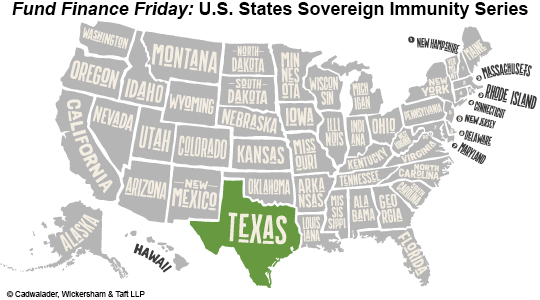After leaving South Dakota and taking on a full tank of gas in Tennessee last week, today we have our biggest prize in our 50-state road trip of sovereign immunity: Texas. It’s our luck to be your driver for this leg of the trip, and we will do our best in this article, which will just focus on Texas and no other state given its importance in fundraising and the complexity of its sovereign immunity problems.
Most people in the market know to be careful with sovereign immunity when it comes to a Texas investor that is an arm of the state. Most bankers and funds also know that inclusion of such investors in the borrowing base is limited to exceptional circumstances or only with a hurdle concept if at all. Today, our goal is to understand the problems facing our market when it comes to sovereign immunity in Texas so that all market participants can see the risks with clear eyes and assess them candidly.
First, a general recap of sovereign immunity issues when it comes to investors that are an arm or agency of the state. (For a more in-depth overview of sovereign immunity as a concept, see our first installment of the series here.) Since the United States is a federal system, each state has sovereign status within that system as codified by the Eleventh Amendment. (Texas is in fact a great example of this sovereign status, since it was an independent republic before admission to the United States.) As a result of its sovereign constitutional status, a state may raise a defense that it may not be sued under the long-standing doctrine of sovereign immunity.
Over time, as states have engaged in more commercial activity, most states have recognized that sovereign immunity should not apply in a commercial context, such as a breach of contract when the state is a party to such contract. As a result, most states have statutes or case law that have adopted or recognized waivers to the doctrine of sovereign immunity in a commercial context. Texas is not one of those states.
The rule in Texas is that the state and arms of the state retain sovereign immunity absent a specific waiver provided by the Texas legislature. A statutory waiver of immunity must be “effected by clear and unambiguous language.” Tex. Gov‘t Code Ann. § 311.034. In addition, the Texas Supreme Court has stood by this principle time and again – it is up to the state legislature to grant waivers, not the courts, when it comes to the state’s immunity from suit. See Wichita Falls State Hosp. v. Taylor, 106 S.W.3d 692, 695 (Tex. 2003). In that respect, the problem in Texas is not at all complex: we know we don’t have a waiver of sovereign immunity unless the Texas legislature has enacted one into law. If this is your only takeaway from the article, you are probably halfway there in understanding the risk.
However, there are two issues that can cause confusion. One is that there is a certain type of immunity that Texas courts have found is waived in certain circumstances. If you hear or read somewhere that says Texas courts have recognized a waiver to sovereign immunity in a contractual context, this would refer to immunity from judgments, not immunity from suits. Sovereign immunity has two concepts: immunity from suit (there is no waiver in Texas absent a specific law from the legislature) and immunity from judgment (an arm of the state can waive immunity from judgment by engaging in a proprietary action – that is, under Texas case law, non-governmental function – in certain circumstances). The question of when a Texas sovereign entity waives immunity from judgment is a complex question of Texas case law, but we actually can ignore that for our purposes: it’s the immunity from suit that would bar any recovery in the first place.
The second confusion is that the Texas legislature has in fact provided a limited waiver from suit back in 2005, but the confusion comes in understanding the scope of this waiver. This waiver covers qualifying local government entities’ immunity for breaches of contract and can be found at Texas Local Government Code Section 271. However, the qualifying local government entity definition is pretty narrow: either a municipality, public school district or special-purpose district. Texas Local Government Code Sec. 271.152. It does not, per statute, include a county or a unit of state government. Texas law helpfully defines what a unit of state government is (that is, not covered by the legislature’s waiver): “the state or an agency, department, commission, bureau, board, office, council, court, or other entity that is in any branch of state government and that is created by the constitution or a statute of this state, including a university system or institution of higher education.” Tex. Gov‘t Code Ann. § 2260.001(4). In sum, with respect to this limited waiver, it is a very short list of investors that qualify for such waiver and a very long list of investors who cannot.
We hope you have enjoyed this installment of our series, which was a bit unusual as we only focused on one state. However, given its prominence in fundraising and the problems sovereign immunity presents in Texas, we thought it was worth a stand-alone feature. In our next and penultimate installment, we will discuss Utah, Vermont, Virginia and Washington as we come toward the end of our 50-state survey.







 />i
/>i

